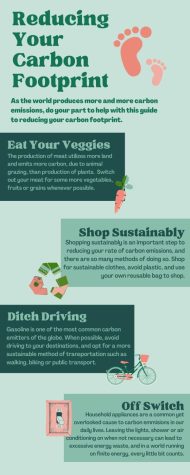Doing Our Part
April 14, 2023
Despite the severity of the Willow Project’s outcomes in the project’s approval, the future of the planet still manages to remain a malleable problem, which gives hope in countering this excessive environmental damage. The UN reports that at the rate of environmental damage now, there is less than a decade left for irreversible climate change to occur globally. It is up to us as a community to prevent this statistic from coming true. The idea of being the change can seem overwhelming, but in reality, the smallest adjustments in each person’s daily life could make the greatest difference years later when immediate environmental consequences begin to show.
The primary concern with the Willow Project reflects an unmanageable increase in carbon dioxide in the atmosphere. The best way for each individual to counteract the effects is by managing their carbon footprint. A carbon footprint is the total amount of greenhouse gasses that are generated by a person’s actions. Focusing on reducing your carbon footprint can include something as simple as the diet you eat, but can have long-term effects that potentially save our planet from its approaching collapse.
How much Carbon does your family create? Check out CoolClimate Network here.
“You can view a lot of actions through a carbon lens. The products you buy daily contribute to your carbon footprint,” Hage said.

Besides personal carbon footprint reduction, we can work as a community to prevent the excessive burning of fossil fuels by using renewable energy sources. Wind and solar energy sources emit much lower greenhouse gasses than fossil fuels and can cost even less to extract than oil. The efficiency of renewable energy may not compare completely with coal or oil, but at the cost it saves environmentally, it is a much stronger alternative to fossil fuels.
“If you get an electric vehicle instead of a gas-powered vehicle, the [environmental] effects are a bit better. Moving away from fossil fuels [and] towards more sustainable energy sources creates just as many — if not more — jobs. In general, fossil fuel use affects everyone globally, and we should promote renewable sources instead,” Gillies said.
Among the extensive drilling debate associated with the Willow Project, the world has gotten a wake-up call to the looming dangers of such common environmental damage. After years of environmental struggle, the state of the planet can often leave communities feeling hopeless in reversing the damage, especially when the same problems that caused such harmful environmental effects are being approved again and again by governments and then rationalized for political or economic reasons. At the level of damage our planet has endured, the cost of the Earth should not be a debatable topic. But this seemingly impossible change starts with each and every person who cares — and if the Willow Project teaches us anything, it is that we must step up and face the climate crisis.
“We have a moral responsibility to try our best to save the environment. Just pushing little bits at a time, chipping away at [the issue], it’s going to make a huge impact,” Gillies said. “Regardless of whether or not we can, at this point, we have to.”
